How much does a public defender cost in Arizona?
Key Points
- Role of a Public Defender: Public defenders in Arizona are court-appointed attorneys who provide legal defense to individuals unable to afford private counsel, ensuring the constitutional right to representation is upheld.
- Eligibility Criteria: Eligibility for public defender services is primarily determined by financial need. Defendants must demonstrate indigency, typically assessed through financial documentation reviewed by the court. Each court may have specific guidelines, especially for misdemeanor cases.
- Associated Costs: While public defender services are provided without upfront costs, courts may assess fees based on the defendant’s financial situation. For instance, in Tucson, fees range from $50 to $450, with payment plans available. Additionally, Arizona law permits courts to order an indigent administrative assessment of up to $25.
- Application Process: Defendants can request a public defender during their initial court appearance. The court evaluates the request, considering financial status and the nature of the charges, to determine eligibility.
- Comparison with Private Attorneys: Private legal representation can be costly, with fees varying based on case complexity and attorney experience. Public defenders offer a cost-effective alternative for those who qualify, ensuring access to legal defense regardless of financial means.
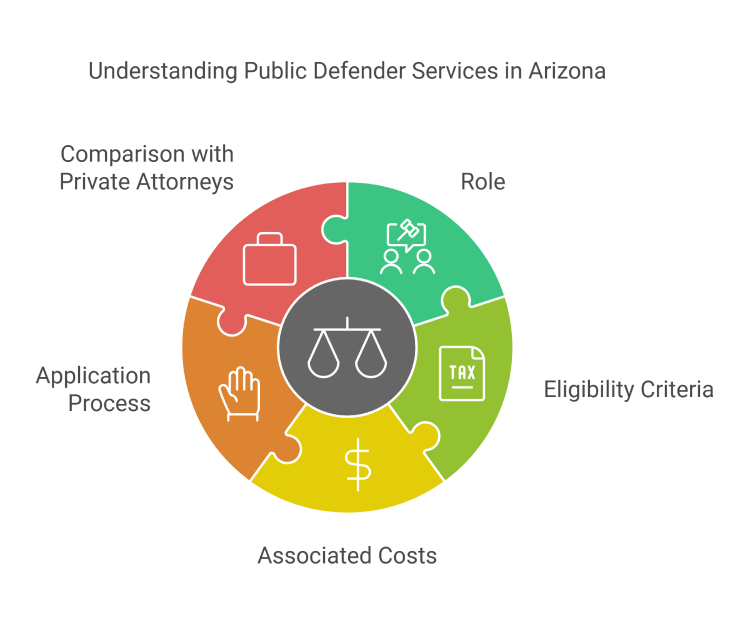
Important Definitions
- Indigency: A state of financial hardship preventing an individual from affording private legal counsel.
- Indigent Administrative Assessment: A fee, not exceeding $25, that courts may impose on defendants receiving public defender services.
- Application Fee: A nominal fee that may be required when applying for public defender services, varying by jurisdiction.
- Reimbursement: The court may require defendants to repay a reasonable amount to the county for the cost of legal services provided by a public defender, considering the defendant’s financial resources.
In the vast desert landscape of Arizona, where the sun casts long shadows and justice is a pursuit etched into the fabric of society, the role of a public defender stands as a beacon for those who find themselves entangled in the legal system. But how much does it really cost to secure the services of a public defender in this southwestern state? It’s a question that echoes in the halls of courthouses and lingers in the minds of many who face legal challenges.
Public defenders serve as the unsung heroes for many defendants who cannot afford private legal representation. In Arizona, the costs associated with hiring a public defender are shrouded in mystery yet are governed by specific state-mandated guidelines. This article will take you on a journey through the labyrinth of public defender costs in Arizona, exploring eligibility criteria, fees, and comparisons with private legal representation.
For those seeking clarity on this critical issue, understanding the structure and implications of public defender costs is essential. Let’s delve into the intricacies and unravel the complexities to provide a comprehensive guide to navigating public defender costs in Arizona.
Understanding the Role of a Public Defender
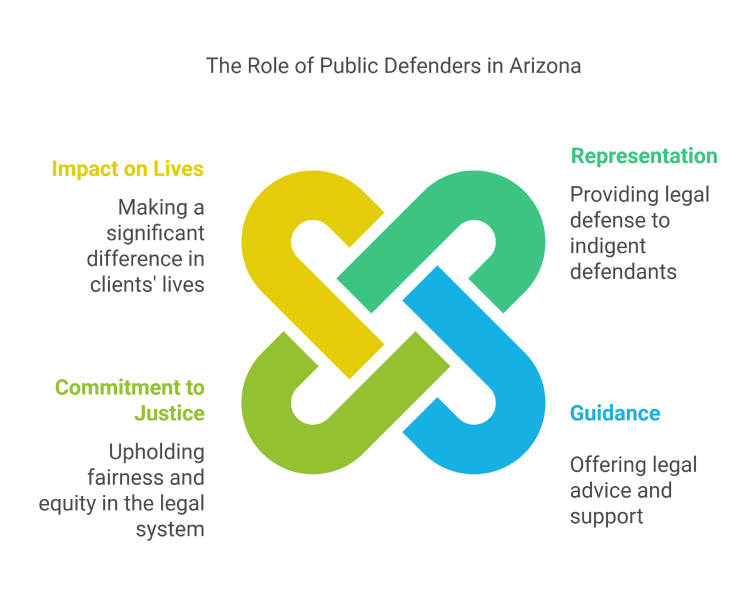 Picture a courtroom, where justice teeters on a delicate balance. The public defender strides in, a sentinel of equity amidst the grandeur of legal discourse, ensuring that every voice is heard, regardless of its financial volume. The role of a public defender in Arizona is nothing short of pivotal, serving as the lifeline for those who cannot afford a private attorney.
Picture a courtroom, where justice teeters on a delicate balance. The public defender strides in, a sentinel of equity amidst the grandeur of legal discourse, ensuring that every voice is heard, regardless of its financial volume. The role of a public defender in Arizona is nothing short of pivotal, serving as the lifeline for those who cannot afford a private attorney.
Public defenders are appointed to represent indigent defendants, individuals who lack the means to secure legal representation. Their mission is to provide competent, dedicated defense, safeguarding the constitutional right to legal counsel. This responsibility is underscored by the Arizona Judicial Branch, which outlines the duties and expectations placed upon these legal advocates.
The public defender’s task is Herculean, often juggling multiple cases simultaneously, yet they are driven by an unwavering commitment to justice. Their role extends beyond mere representation; they offer guidance, navigate complex legal waters, and stand as a beacon of hope in what can be a daunting judicial process.
As we unravel the tapestry of public defender services in Arizona, it’s crucial to appreciate the profound impact these professionals have on the lives they touch. They are the unsung champions of the courtroom, ensuring that justice is not a privilege, but a right accessible to all.
Qualifications for Public Defender Services in Arizona
Embarking on the path to securing a public defender in Arizona is akin to navigating a legal labyrinth, where eligibility and application processes form the essential checkpoints. The journey begins with understanding the qualifications required to access these crucial legal services.
Eligibility Criteria
In Arizona, the eligibility for a public defender is primarily determined by financial status. Individuals must demonstrate indigency, a state of financial hardship that hinders their ability to afford private legal counsel. This determination is guided by specific criteria and often involves submitting financial documentation for review by the court. For a detailed understanding of indigency and related qualifications, the Arizona Courts Self-Service Center offers a wealth of resources.
Application Process
The application process for securing a public defender often begins at the arraignment, where defendants can express their need for legal representation. The court then assesses their financial situation, considering both income and assets, to make a decision. This process ensures that only those who genuinely require assistance receive it, preserving resources for those in need.
As we delve deeper into the nuances of public defender services, it’s vital to appreciate the rigorous qualifications in place. These measures ensure that the support provided is both just and equitable, reserving the services for individuals who truly need them.
Public Defender Fees and Costs in Arizona
In the realm of justice, where every penny counts, the costs associated with public defender services in Arizona are a topic of considerable consequence. These fees, often dictated by state mandates, serve as the financial fulcrum upon which access to legal representation pivots.
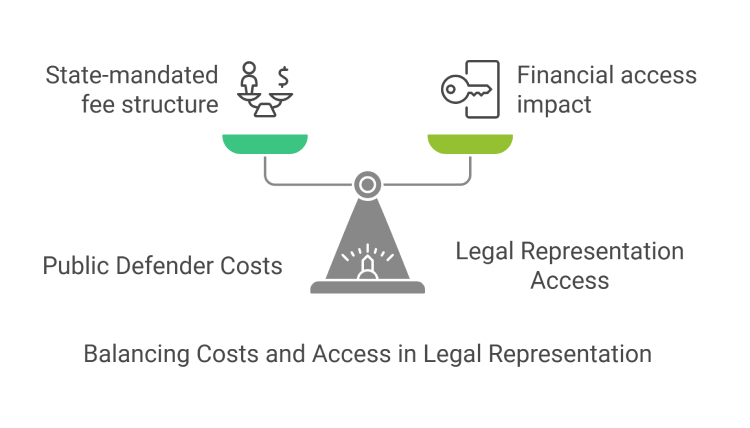
State-Mandated Fees
Arizona, like many states, operates under specific guidelines that dictate the fees associated with public defender services. These fees can vary based on the nature of the case and the jurisdiction in which it is tried. According to the Arizona Judicial Branch, defendants may be required to pay an application fee to access public defender services, though this fee is typically quite nominal compared to the cost of private representation.
Costs for Indigent vs. Non-Indigent Clients
The financial landscape shifts significantly based on a defendant’s indigency status. Indigent clients, those who meet specific financial criteria, often receive services at a reduced cost or even for free, while non-indigent clients may face higher fees. This distinction underscores the principle of equitable access to justice, ensuring that financial barriers do not obstruct legal representation.
Additional Court-Related Expenses
Beyond the basic fees, defendants may also encounter additional court-related expenses. These can include costs for expert witnesses, investigations, or other specialized services necessary for a robust defense. While public defenders strive to minimize these expenses for their clients, they remain an essential consideration in the broader financial picture of legal defense in Arizona.
As we navigate the intricate web of public defender fees and costs, it’s clear that understanding these financial dynamics is crucial for those seeking legal representation. Armed with this knowledge, individuals can better navigate the legal system, ensuring their right to counsel is both accessible and fair.
Comparing Public Defender Costs to Private Legal Representation
In the intricate dance of justice, choosing between a public defender and a private attorney is akin to selecting between a modest carriage and a luxury chariot. Both promise to lead you through the legal labyrinth, but the costs and experiences differ significantly.
Public defenders, backed by state resources, offer their services based on a client’s financial need. For many, this translates to minimal or no fees, as long as they meet the eligibility criteria for indigency. This accessibility is crucial in ensuring that justice is not just a privilege for the wealthy but a right for all.
Conversely, hiring a private attorney often entails a steeper financial commitment. Fees can vary widely, sometimes reaching thousands of dollars, depending on the complexity of the case and the attorney’s experience. This investment, however, frequently comes with personalized attention and potentially more resources at one’s disposal.
For those weighing their options, the decision hinges on more than just cost. Factors like the nature of the charges, the potential consequences, and personal comfort and trust in the legal representative all play pivotal roles. As you stand at this crossroads, it’s essential to ponder not just the financial implications but the value each path offers in the pursuit of justice.
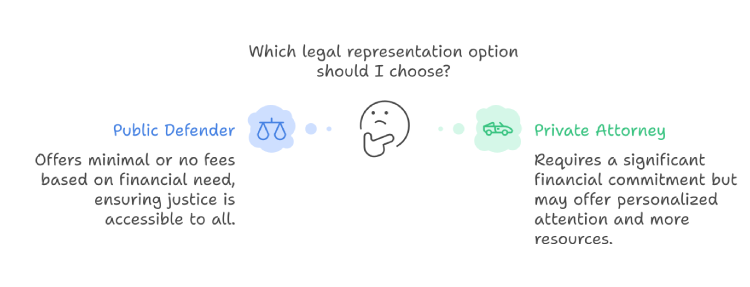
Financial Assistance and Fee Waivers
For many, the pursuit of justice is not merely a legal journey but a financial one as well. In Arizona, financial assistance and fee waivers serve as the lifelines for those who find themselves ensnared in the legal system without the means to pay for representation.
Options for Reduced Fees
Navigating the legal realm can be daunting, but Arizona offers pathways to lighten the financial load. Defendants may be eligible for reduced fees based on their income level and other financial factors. The state recognizes the importance of equitable access to justice and provides mechanisms to ensure that financial constraints do not hinder the right to a fair defense. For more detailed information on these options, the Arizona Courts Self-Service Center offers valuable resources.
Qualifying for Financial Assistance
For those seeking financial assistance, the key lies in demonstrating financial hardship. This involves a thorough review of one’s financial situation, including income, expenses, and assets. The court evaluates this information to determine eligibility for fee waivers or reduced costs. This process ensures that assistance is directed to those who truly need it, preserving the integrity of the system.
Understanding the options available for financial assistance and fee waivers is essential for those facing legal challenges in Arizona. By exploring these avenues, individuals can ensure that their right to legal representation remains intact, irrespective of their financial situation.
Impact of Hiring a Public Defender on Legal Outcomes
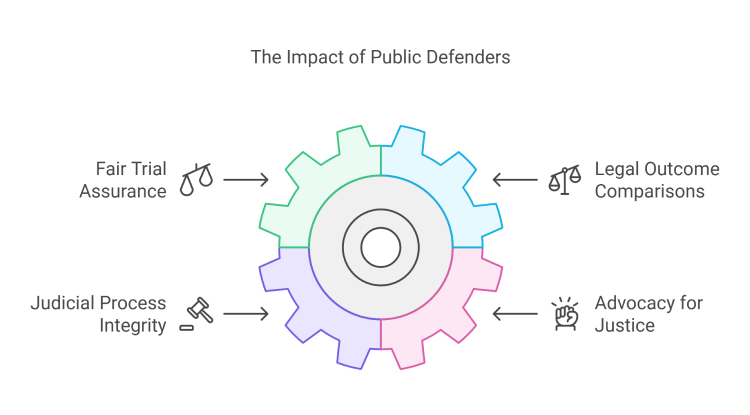 In the courtroom theater, where justice is the grand performance, the role of a public defender can significantly influence the drama’s outcome. These legal stalwarts, often perceived as the underdogs, wield the power to shape destinies and alter narratives, one case at a time.
In the courtroom theater, where justice is the grand performance, the role of a public defender can significantly influence the drama’s outcome. These legal stalwarts, often perceived as the underdogs, wield the power to shape destinies and alter narratives, one case at a time.
Public defenders, by their very nature, are dedicated to protecting the rights of those who cannot afford private representation. Their impact on legal outcomes is profound, ensuring that defendants receive a fair trial rooted in the principles of justice and equity. This commitment to fairness is underscored by the Arizona Judicial Branch, which emphasizes the critical role public defenders play in maintaining the integrity of the judicial process.
While some might question the effectiveness of public defenders given their heavy caseloads, studies and reports by organizations like the ACLU have shown that these legal advocates often achieve comparable outcomes to their private counterparts. Their deep understanding of the local legal landscape and their relentless pursuit of justice enable them to navigate complex cases with skill and tenacity.
Ultimately, the impact of hiring a public defender extends beyond the individual case. It upholds the very essence of justice—ensuring that every individual, regardless of financial standing, has the opportunity for a fair and just legal process.
Case Studies: Cost Examples from Arizona Counties
In the sprawling expanse of Arizona, the cost of securing legal representation through a public defender can vary significantly across its diverse counties. These variations are often influenced by local policies, the availability of resources, and the unique demographic landscape of each region. Let’s explore some case studies from notable counties, offering a clearer picture of what individuals might expect when seeking public defender services.
Maricopa County
As the most populous county in Arizona, Maricopa County has a well-structured public defense system. Here, the cost for indigent clients is often minimal, typically limited to a nominal application fee. However, non-indigent clients might face additional charges, reflecting the county’s commitment to ensuring access to justice for those who most need it. For more about how the county manages legal representation costs, the Maricopa County Public Defense Services offers detailed insights.
Pima County
Moving south to Pima County, individuals will find a similar approach to public defender costs. The county’s legal aid system is tailored to accommodate defendants with varying financial backgrounds, ensuring that indigent clients receive necessary services without overwhelming costs. This commitment to equitable justice is further detailed by the Pima County Public Defense Services.
Rural Counties
In Arizona’s rural counties, the landscape shifts once again. Limited resources often mean a heavier reliance on state funding, which can influence the availability and cost of public defender services. Despite these challenges, these counties strive to provide equitable legal representation, often seeking innovative solutions to overcome resource constraints.
These case studies highlight the diverse financial landscapes across Arizona’s counties, emphasizing the importance of understanding local nuances when navigating public defender costs. For those entangled in the legal system, this knowledge serves as a vital tool in ensuring access to fair and just legal representation.
Key Takeaways
As we traverse through the multifaceted terrain of public defender costs in Arizona, several key insights emerge that are crucial for anyone navigating this legal landscape. First and foremost, understanding that the role of a public defender is indispensable is essential. They are not just legal representatives but guardians of justice for those who cannot afford private counsel.
The eligibility criteria and application process for accessing public defender services are rooted in the principle of financial need. This system ensures that the most vulnerable individuals receive the support they require, as detailed by the Arizona Courts. Meanwhile, the financial distinctions between indigent and non-indigent clients highlight the state’s commitment to equitable access to justice.
Additionally, comparing public defender costs to private legal representation reveals a stark difference in potential expenses, making public defenders a viable and often necessary option for many. This comparison is grounded in the reality that legal representation should be a right, not a privilege.
Lastly, the varied landscape across Arizona’s counties underscores the importance of understanding local nuances and resources. Whether in urban centers like Maricopa and Pima or rural areas, the commitment to fair representation remains steadfast, ensuring justice is accessible to all, regardless of financial standing.
Final Analysis
As we reach the end of our exploration into the costs and intricacies surrounding public defenders in Arizona, it’s clear that the journey through legal representation is as varied as the desert landscape itself. From the eligibility criteria and state-mandated fees to the comparisons with private legal representation, every facet of this system is designed to ensure that justice remains a fundamental right accessible to all, irrespective of financial status.
Public defenders, often the unsung heroes of the courtroom, stand as bastions of fairness, tirelessly working to safeguard the legal rights of those they represent. Their role is not just about legal defense; it’s about championing equity and ensuring that justice does not discriminate based on financial capability. The state of Arizona, through its structured guidelines and resources, strives to uphold these principles, making legal representation available to those who need it the most.
As you navigate the legal challenges within Arizona, armed with the knowledge of public defender costs and services, remember that justice is not just a destination but a journey—a journey where everyone deserves a fair chance to be heard and represented. Let this guide serve as a compass, steering you through the complexities of the legal system, ensuring that you are empowered to make informed decisions in pursuit of justice.
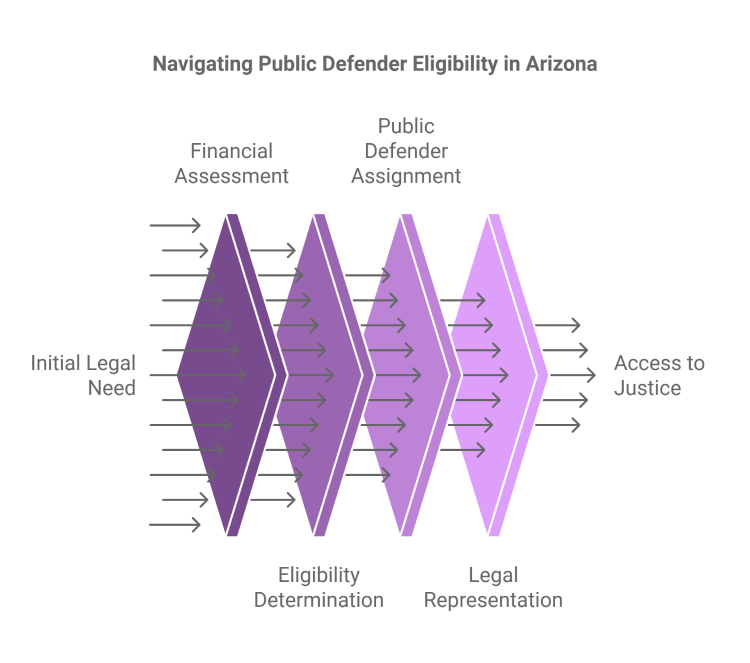
FAQ
- What is a public defender? A public defender is a court-appointed attorney who provides legal representation to individuals unable to afford private counsel, ensuring their constitutional right to legal defense.
- How do I qualify for a public defender in Arizona? Qualification is based on financial need. Defendants must demonstrate indigency, often through financial documentation, to be eligible for public defender services.
- Are public defender services free in Arizona? While there are no upfront costs, courts may assess fees based on the defendant’s financial situation, such as an indigent administrative assessment of up to $25.
- How do public defender costs compare to private attorneys? Public defenders provide a cost-effective alternative to private attorneys, who may charge substantial fees depending on case complexity and their experience.
- Can I choose my public defender? No, public defenders are appointed by the court, and defendants do not have the option to select a specific attorney.
- What types of cases do public defenders handle? Public defenders handle various cases, including criminal charges, mental health commitments, and juvenile delinquency proceedings, as appointed by the court.
- Can I switch to a private attorney after being assigned a public defender? Yes, defendants can hire a private attorney at any time, but they will be responsible for the associated costs.
- What happens if I don’t qualify for a public defender? If you don’t qualify, you’ll need to hire a private attorney or represent yourself in court.
- Do public defenders have the same qualifications as private attorneys? Yes, public defenders are licensed attorneys in good standing with the state bar and possess the necessary qualifications to practice law.
- Can I appeal a court’s decision regarding public defender eligibility? Yes, you can request the court to reconsider its decision or provide additional financial information to support your eligibility.
- What should I do if I can’t afford the fees assessed for public defender services? Inform the court of your financial situation; they may offer payment plans or adjust the fees accordingly.
- Are there any other costs associated with public defender services? Additional court-related expenses, such as expert witness fees or investigation costs, may apply, depending on the case.
- How can I apply for a public defender in Arizona? Request a public defender during your initial court appearance; the court will assess your financial eligibility.
- What is the role of a public defender during a trial? Public defenders provide legal defense, advice, and counsel throughout the trial process, ensuring the defendant’s rights are protected.
- Can a public defender assist with appeals? Yes, public defenders can represent clients in appeals to higher courts if appointed by the court.


